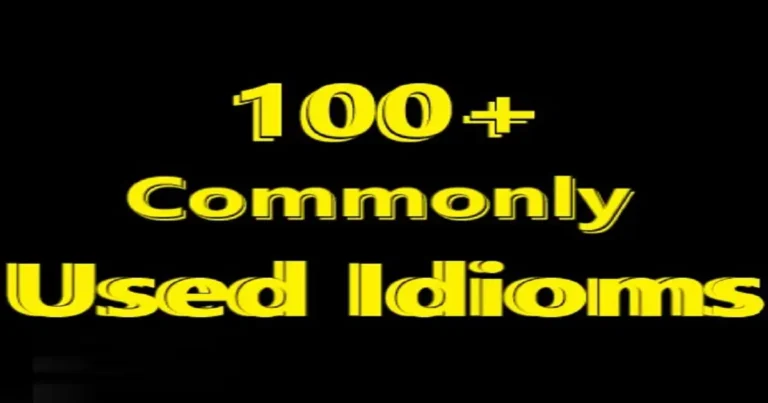Idioms in English – If you’re a fan of English movies, series, books, or newspapers, chances are you’ve encountered numerous idioms that puzzled you. Understanding the true meaning behind these colorful phrases can be a delightful journey. Next time you stumble upon an unfamiliar idiom, take a moment to grasp its essence and then revisit the scene or passage. Prepare to be amused as the pieces fall into place.
Language learning doesn’t have to be a tedious endeavor. What if you could have fun while mastering a language? If your answer is a resounding “yes,” then English is the perfect playground for you. In this blog post, we will explore the world of idioms: their meanings, definitions, usage, and the most commonly used idioms with their accompanying explanations. Moreover, we’ll delve into the realm of movies, TV series, and literature, extracting examples to deepen our understanding.
What is an Idiom?
An idiom is a unique phrase or group of words that takes on a figurative meaning distinct from the literal interpretation of its individual components. According to esteemed dictionaries such as Cambridge Dictionary and Oxford Learner’s Dictionary, idioms are defined as a set of words whose collective meaning differs from the meanings of the words in isolation.
The Collins Dictionary elaborates further, defining idioms as word combinations that acquire a distinct meaning when used together, deviating from the meaning each word carries independently. The Merriam-Webster Dictionary adds yet another layer to the definition, stating that idioms are expressions that possess either a non-derivable meaning based on their constituent words (e.g., “up in the air” meaning “undecided”) or exhibit grammatically unconventional word usage (e.g., “give way”).
Why Use Idioms in Sentences?
Idioms wield significant linguistic power, provided they are aptly employed in suitable contexts. Understanding idioms goes beyond interpreting the meaning of each individual word; it requires a grasp of the phrase as a whole.
While idioms may not find their place in formal or professional writing, they add a touch of uniqueness to creative compositions and speeches. Idioms can also convey puns and sarcasm. However, as with any linguistic tool, caution must be exercised when using idioms. They only make sense to an audience familiar with their meanings. Therefore, it is crucial to consider your audience’s comprehension levels before incorporating idioms into your communication.
List of 100+ Common Idioms
- Up in the air – Still to be settled
- All things considered – Taking all factors into consideration
- On the same page – In general agreement (with someone)
- Out of work – unemployed
- Move up in the world – Become more successful
- Cash-Strapped – In need of money
- Flat broke – Having no money at all
- Dime a dozen – Very cheap; easily obtained
- Think outside the box – Try to solve a problem in an original way; think creatively
- Stumbling block – An obstacle, physical or abstract
- Burn the midnight oil – Working late into the night
- Thank God it’s Friday – Let’s be happy that the workweek is over!
- On point – Good, well done, effective
- Put one’s face on – Apply cosmetics
- Catch someone’s eye – Attract someone’s attention
- Cry your eyes out – Cry hard for a very long time
- All ears – Listening willingly, waiting for an explanation
- Lend an Ear – Listen
- Wet behind the ears – Inexperienced, immature, new to something
- Pay an arm and a leg – A very high cost
- Change of heart – A change in one’s opinion or outlook
- Tough one’s heart – Affect someone emotionally, be touching
- Get one’s hands dirty – To do the unpleasant parts of a job
- Stiff-Necked – Stubborn; excessively formal
- Get in shape – Exercise in order to improve one’s physical condition
- Babe in the woods – An innocent, naïve person
- Wet behind the ears – In experienced, immature, new to something
- First in, best dressed – The first people to do something will have an advantage
- Old hat – Old-fashioned, predictable
- Bad egg – Someone who is not to be trusted
- Bottom of the Barrel – Low-quality choices
- Couch potato – A lazy person who watches a great deal of television
- Eat Someone’s Lunch – Defeat someone thoroughly
- Hard nut to crack – A difficult problem or a difficult person
- Have egg on your face – They are made to look foolish or embarrassed
- In a nutshell – Expressed in a few words
- Piece of cake – very easily done
- Spill the beans – Reveal a secret
- Think big – Consider ambitious plans
- Let one’s hair down – To relax and enjoy themselves
- Take it easy – When you relax, or do things at a comfortable pace
- Blow one’s top – Lose one’s temper
- Go bananas – To become irrational or crazy
- Under one’s belt – Safely or satisfactorily achieved, experienced, or acquired
- Hit the roof – Explode in rage; become extremely angry
- Run into a buzz saw – Encounter severe and unexpected problems
- Cutting-edge – Very novel, innovative
- Run out of steam – Lose momentum, become tired
- Fly on the Wall – To be an unnoticed observer
- Ants in your pants – Restlessness
- Bell the cat – Take on a difficult or impossible task
- Early Bird – Someone who gets up early
- Get someone’s goat – To irritate someone deeply
- Go to the dogs – To become disordered, to decay
- Beyond the pale – Too morally or socially extreme to accept
- Mother Nature – The natural world
- Through the grapevine – Via gossip
- Out of the woods – No longer in danger
- All wet – Completely mistaken
- On cloud nine – Extremely happy
- Rain cats and dogs – rain heavily
- Chase rainbows – To pursue unrealistic goals
- Once in a blue moon – Very rarely
- Bad apple – A discontented, troublemaking, or dishonest person
- Go pear-shaped – To fail; to go wrong
- Life is a bowl of cherries – Life is wonderful or very pleasant
- Second banana – A person in a subservient position
- Snowball’s chance in Hell – No chance at all
- Behind the scenes – In a way not apparent to the public
- Cooking up a storm – Cooking a great food
- Hit the books – To study (generally said of students)
- Hit the hay – To go to bed
- Change one’s tune – To alter one’s opinion about something
- Face the music – Dealing with consequences of one’s actions
- Get the picture – Understand what’s happening
- When it rains, it pours – Problems tend to come in groups
- Behind the times – Old-fashioned
- Take your time – Don’t hurry, work at a relaxed pace
- Time is Money – Time is valuable, so don’t waste it

